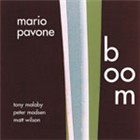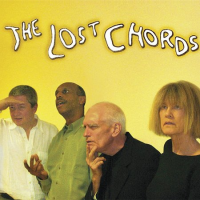Home » Jazz Articles » Album Review » Paul Brody's Sadawi: Beyond Babylon
Paul Brody's Sadawi: Beyond Babylon
Over half of Beyond Babylon evolves from Brody deconstructing pieces by four modern klezmer musicians/composers—Frank London ("Golem Khosidl"), David Krakauer ("Klezmer à la Bechet"), Glenn Dickson ("Fragment of Kafka's Friend"), and Ben Goldberg ("Masks and Faces"). In some cases the reinvention of these pieces comes from the most minimal of sources, as in "Fragment of Kafka," where Brody takes the last four notes of Dickson's melody from his "A Friend of Kafka" and establishes them as Martin Lillich's bass line, with scattered notes from Dickson's clarinet melody serving as a reference point for the more spacious beginning and end sections.
As a player, Brody straddles the line between pure lyricism and freer expression, often within the space of the same piece. Again, on "A Fragment of Kafka's Friend" he alternates a melodic line with extended techniques that are reminiscent of some of Dave Douglas' more outward playing.
Sadawi treats the material with a certain amount of honour, but with an equal degree of irreverence. "Two Be Simple" begins with a more traditional dervish-like hora, but while drummer Eric Rosenthal maintains a looser version of the rhythm, guitarist Brandon Seabrook takes a banjo solo that comes right out of Derek Bailey territory. Seabrook, in fact, is the find of the set, bringing a surprisingly diverse aesthetic to the proceedings that leans more to a rock sensibility. On "Basketball Barmitzva" his overdriven guitar is equal parts Marc Bolan and Marc Ribot, while his alternating of chunky Steve Cropper rhythms with heavier power chords on the theme of "Klezmer à la Bechet" lends an approachable edginess before Lillich and Rosenthal introduce an almost funky vamp over which he layers a more free-ranging solo.
Like some of John Zorn's early material, only less frenetic, Brody's compositions and deconstructions run through a wealth of ideas in relatively short time frames. "Masks and Faces," which features guest accordionist Alan Bern, begins with a simple repeated phrase before clarinetist Jan Hermerschmidt and Bern deliver the theme over a rhythmic backdrop that is playful and varied. Time builds and breaks down, with Lillich and Rosenthal running the gamut from simple groove to elastic free playing.
It is, in fact, Brody's ability to embrace a musical tradition, while at the same time managing to avoid all its trappings, that makes Beyond Babylon such an intriguing listen. Time shifts, melodies weave in and out, dynamics ebb and flow, and pieces shift from heavily structured form to complete freedom, yet the program retains a sense of focus that makes it feel more like a multi-part suite than a collection of discrete songs. Beyond Babylon challenges the boundaries of traditional Jewish music by questioning its very essence and, in the final analysis, takes it to new places not previously envisioned.
Track Listing
Two be Simple; Basketball Barmitzvah; A Fragment of Kafka's Friend; Masks and Faces; (for Abraham Heschel) Timepeace; Klezmer
Personnel
Paul Brody
trumpetPaul Brody (trumpet), Jan Hermerschmidt (clarinet, bass clarinet), Brandon Seabrook (banjo, guitar, electronics), Martin Lillich (bass), Eric Rosenthal (drums)
Special Guest: Alan Bern (melodica on "Glass Dance," accordion on "Masks and Faces," "Timepeace")
Album information
Title: Beyond Babylon | Year Released: 2004 | Record Label: Tzadik
Tags
PREVIOUS / NEXT
Support All About Jazz
 All About Jazz has been a pillar of jazz since 1995, championing it as an art form and, more importantly, supporting the musicians who make it. Our enduring commitment has made "AAJ" one of the most culturally important websites of its kind, read by hundreds of thousands of fans, musicians and industry figures every month.
All About Jazz has been a pillar of jazz since 1995, championing it as an art form and, more importantly, supporting the musicians who make it. Our enduring commitment has made "AAJ" one of the most culturally important websites of its kind, read by hundreds of thousands of fans, musicians and industry figures every month.




















